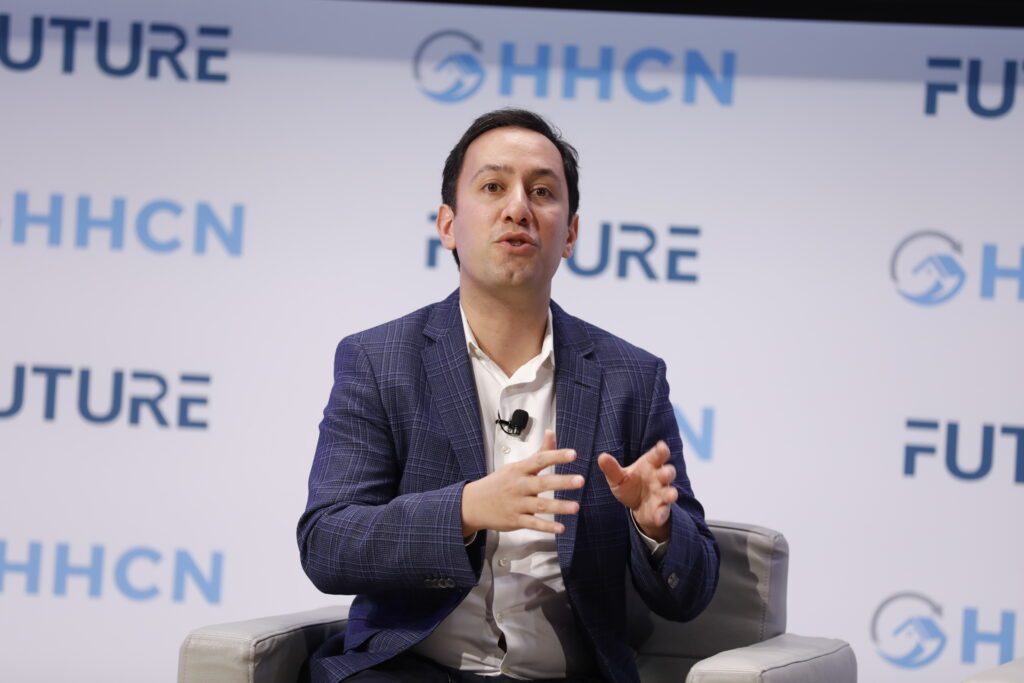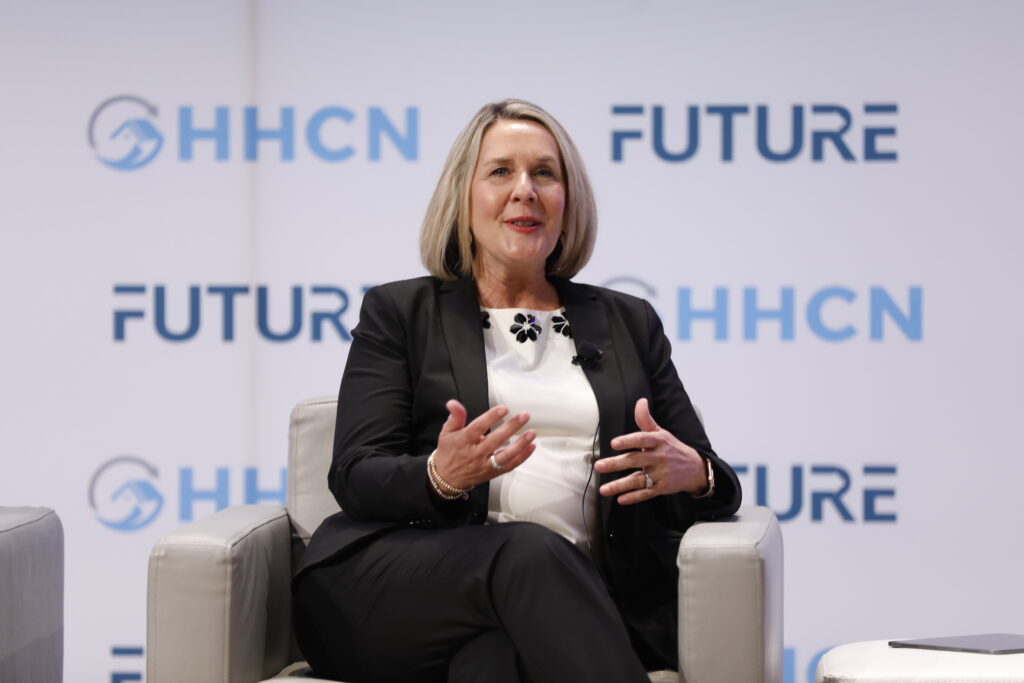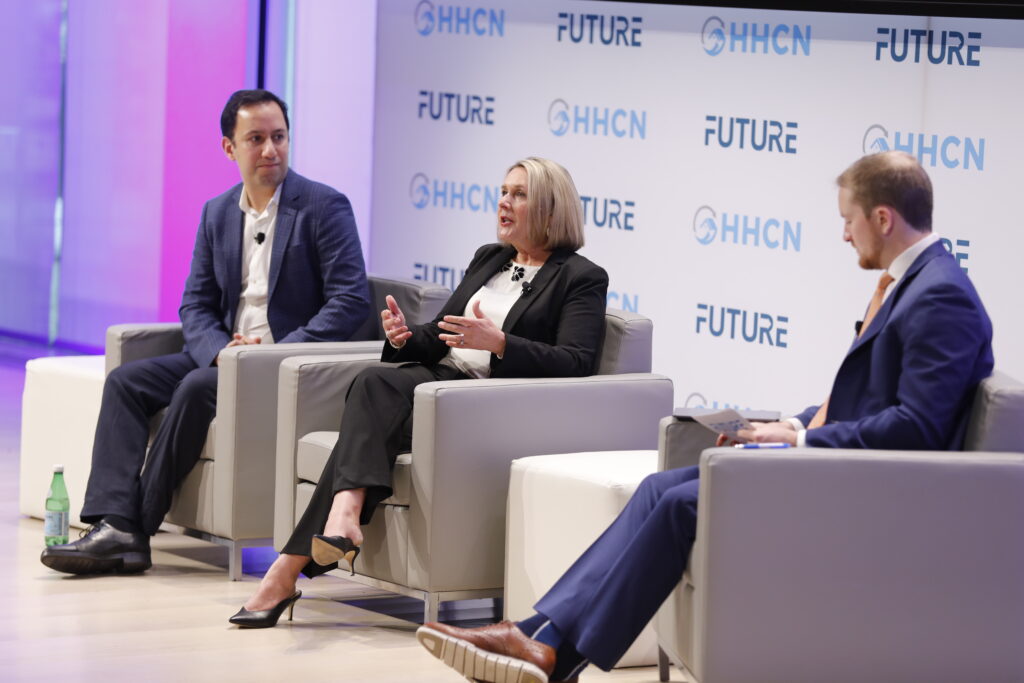The home health leader of one of the nation’s largest health insurers believes the industry will need to be ready to move toward value-based care.
Meanwhile, critics of Medicare Advantage (MA) should start to spend time with payers to understand what their needs are and what is driving up their costs. In turn, home health providers can form a clearer picture of where they fit in as a solution.
Those were two of the main messages Susan Benoit, president of Humana Inc.’s (NYSE: HUM) CenterWell Home Health, relayed at Home Health Care News’ FUTURE event last week.
“I would encourage all home health providers to embrace Medicare Advantage payers,” Benoit said. “We’re all moving to value-based care. We’re moving with CMS to value-based purchasing in 2025, but we’re also moving to that model as more Medicare beneficiaries are choosing Medicare Advantage plans versus traditional Medicare.”
Formerly known as Kindred at Home, CenterWell Home Health is the rebranded home health organization of the Louisville, Kentucky-based Humana. The CenterWell brand includes the company’s range of payer-agnostic health care offerings, including senior-focused primary care.
Humana and CenterWell have been bullish on value-based care and Medicare Advantage, Benoit said, mainly because that’s where they see the future of home health going.
“Medicare Advantage payers have tremendous data analytics and claims data on their members,” Benoit said. “I would suggest we all spend time with MA payers and really listen to what their pain points are, so we can educate them on what we can do for them.”
As a home health provider, proving your worth and your value will go a long way in today’s market, Benoit said.
For example, if a home health agency has a specialty program that has proved to be exceptional at treating congestive heart failure and keeping patients from going back to hospital for treatments, those are quantifiable data points that MA payers want to see.
“Those are the kinds of things you have to bring to the table with MA payers,” Benoit said. “They’re looking for a reduction in hospitalizations, a reduction in total cost of care, improving star ratings and great patient experience. I think we’ve just got to embrace it.”
Humana is operating value-based care models in 14 of the 38 states it serves, Benoit said. Some of those models are being done through utilization management, but the company is currently working on building a value-based care clinical model and figuring out what the reimbursement rate should look like for a home health company.
Humana and Heal together
With several moving parts finally steady at CenterWell, Benoit said one of the key focuses for the rest of the year and beyond is to integrate patient care through its different brands and partnerships.
That includes its partnership with Heal, a Los Angeles-based in-home primary care provider that focuses mainly on seniors.
Heal is another provider that has invested in value-based care and is already seeing the benefits pay off.
“We operate on a value-based care framework,” Justin Zaghi, the chief medical officer at Heal, said at FUTURE. “We have evidence showing that we’ve saved Medicare — through the Independence at Home project — around $8 million on about 1,000 patients in one year. That was done through reductions in ER visits and hospitalizations. By operating in a risk-based environment, we’re able to capture more of the value that we’re creating for the health care system.”

Humana’s $100 million investment in Heal was just an early sign of both companies leaning into value-based care.
By partnering with like-minded companies like Heal and DispatchHealth, Benoit believes Humana and CenterWell are able to break down the silos throughout the continuum care.
“I think we absolutely are,” she said. “[Working across brands and with partners] creates better communication, better coordination and allows us to have more information about that patient.”
Ownership and partnerships
There are plenty of advantages to Humana’s reach when it comes to what it owns throughout the continuum of care.
One example Benoit brought up was the One Homecare Solutions purchase made in 2021.
One Homecare Solutions — or onehome — is a utilization management convener that has home health operations in South Florida and Texas.
“What this creates is better communication and easier coordination when you have owned assets,” Benoit said. “If we’ve got a nurse in the home seeing a patient, we get a member summary so we know if the prescriptions have been filled recently or not. We have their labs. We understand everything that’s going on with that patient, and there’s communication back and forth with the different entities to reduce rehospitalization, improve the patient experience and provide that continuity of care.”
At the same time, Humana doesn’t believe it can own everything.
That’s why it has strategic partnerships with companies like Heal and DispatchHealth.
“In the Atlanta market, we can reach out to Dispatch if we have a patient that needs urgent care in the home,” Benoit said. “They come into the home, prevent that patient from potentially going to the emergency room, and that’s helped us reduce rehospitalization rates.”
DispatchHealth is specifically good at a certain thing. In its case, that specialty is in-home urgent care. Those are the types of partnerships Humana looks for when deciding who to join forces with.
“We are looking for people that are really good at specific items,” Benoit said. “When we identify a problem or look for opportunities to reduce hospitalizations, reduce total cost of care, provide a better patient experience, we’re looking for those partners that are really, really good at that. Who can provide the data that says, ‘We can make a difference with this patient.’”
“I would suggest we all spend time with MA payers and really listen to what their pain points are, so we can educate them on what we can do for them.”
Susan Benoit, president of CenterWell Home Health.
There is also the middle ground, Benoit said, like Humana deciding to sell a portion of Kindred at Home’s hospice and personal care assets to private equity firm Clayton Dubilier & Rice for $2.8 billion.
“We at Humana felt like we could still get the advantages of owning [personal care] and hospice, but not have to have the majority ownership,” she said. “We value that it’s a very important component of the continuum of care, so we definitely wanted to keep some ownership of that.”
Why clinicians want flexibility
Like any home health provider, CenterWell Home Health has been dealing with unique staffing issues in 2022.
Bruce Broussard, president and CEO of Humana, and Benoit will regularly have listening sessions with the company’s nurses and clinicians to understand the challenges they’re facing.
“One of the most important things that we’re hearing out of those sessions is they want flexible work schedules,” Benoit said. “It may not be that they’re wanting to work part time; it may be that they want to work different days of the week or different hours in the day, so it’s not a Monday through Friday, 8 a.m. to 5 p.m. position.”
Scheduling has been a pain point for CenterWell and many others in the home health industry. Benoit says that making the routing system more efficient can ease the burden on its clinicians.
“I think if we can get more efficient from a routing standpoint, that will make sure we’re not overwhelming clinicians,” Benoit said. “When there’s a shortage, you’re always asking them to take an additional patient, two patients, three patients, and if we’re not careful, we will burn our long-term, successful nurses out.”
It’s also no secret to the home health industry that documentation has been a thorn in the side of clinicians for years. That’s one of the major issues CenterWell’s nurses and other clinicians have had recently.
“Documentation in home health, it’s a lot – and many people are documenting late at night,” Benoit said. “We’re really working on ways that we can reduce the amount of documentation for our clinicians and working with companies that auto populate medications for us into Homecare Homebase, saving clinicians time at the start of care.”
Humana has also hired a clinician experience leader whose sole job is to improve the work life of the company’s clinicians.
Why Humana might be interested in Cano Health
Days after the FUTURE event, news started circulating that primary care provider Cano Health (NYSE: CANO) is exploring a sale.

Humana — as well as CVS Health (NYSE: CVS) — have been rumored to have interest in buying Cano Health, according to sources who spoke with Reuters.
Rumors of Humana buying Cano Health have been in the air since July as Humana has been building out its risk-based capabilities through primary care purchases.
Cano Health is a senior primary care company with 137 medical centers in six states.
In its investor meeting last week, leaders with Humana reported it could spend up to $550 million in expanding its senior-focused, value-based primary care clinics.




